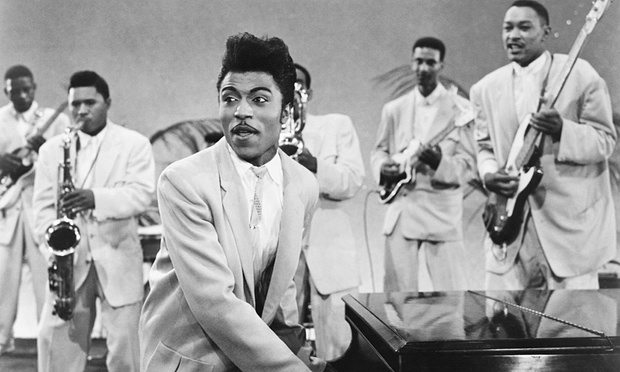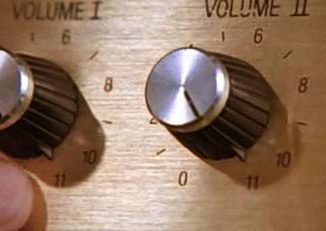Little Richard’s Tutti Frutti was recorded 60 years ago – part of the rich history of nonsense lyrics on great records

Sixty years ago, on 14 September 1955, Little Richard entered J&M studio in New Orleans to make his first recordings for Specialty Records, after four years of trying and failing to make hits for RCA and Peacock Records. The morning session didn’t go well; Richard laid down half a dozen tracks, but none of them managed to capture his ambisexual lightning. The producer, Bumps Blackwell, called lunch and took the crew to the Dew Drop Inn. “Richard saw a piano and a crowd of people: he was one of those people who’s always on stage, and he hit the piano and hollered, ‘A-wop-bop-a-loo-bop-a-good-God-damn!’ – and those were the cleanest words of it,” Blackwell later remembered.
A quick rewrite later, so the song was no longer about anal sex (“If it don’t fit, don’t force it / You can grease it, make it easy,” ran the original), and the first great record of the rock’n’roll boom was ready to record, and with it the first great lyric – Richard’s ecstatic, percussive cry: “Awopbopaloomopalopbombom!” It would be altered – Elvis sang what sounds like “Awopbopalooahalopbamboom”; Pat Boone tried “Awopbopaloomopalopbopbop”; when Nik Cohn wrote his celebration of rock’n’roll’s already distant golden age in 1968, he called the book Awopbopaloobop Alopbamboom, and that’s the pronunciation that seems most common nowadays – but it didn’t matter, because in those 10 syllables, Richard made rock’n’roll’s first greatest promise: we’re gonna have a real good time together. And he did so without making any sense whatsoever.
The phrase itself was something Richard used in everyday speech. “I had Awopbopaloobopalopbamboom! in my hometown, it was a word that I said,” he told Mojo in 1999. “People’d say, ‘How you doin’ Richard?’, I’d say, ‘Awopbopaloobopalopbamboom!’”
There’s a difference between a hit record and a great song. Great songs are mutable: they have meaning that can be explored in different ways by different artists. That’s why anyone can have a bash at Cole Porter, with varying degrees of success. Hit records are sometimes great songs, but they’re often something different – you might be utterly unable to whistle a hit record, because it is dependent on the instrumentation, the production. The very greatest hit records capture a moment, which is why they tend not to be covered again and again down the years – you don’t hear many versions of Tutti Frutti these days. But because everything in a hit record is focussed on how it will sound in the eventual recording, they are packed with lyrics that have little or no meaning.
That was golden rule when Little Richard went into J&M studio, and it’s just as true now. In John Seabrook’s brilliant forthcoming book The Song Machine: Inside the Hit Factory (Jonathan Cape, £16.99, in case you were wondering), he hears about the songwriting techniques of Max Martin – the Swedish writer/producer responsible for 21 US No 1s, starting with Britney Spears’s … Baby One More Time. It’s a style he calls “melodic math”, in which every sound is calculated for maximum impact.
“Max doesn’t really care about the lyrics because he’s Swedish,” Bonnie McKee, who writes words for Martin’s productions, tells Seabrook. “He’s also really stubborn about syllables. A line has to have a certain number of syllables and they have to be mirror images of each other – it’s very mathematical. The syllables in the first part of the chorus have to repeat in the second part.” Elsewhere in the book, Seabrook notes that … Baby One More Time was never intended to summon up images of domestic violence. Martin simply thought “hit me” sounded good, and that it maybe meant something like “phone me”. The sound was what mattered, not the meaning. If you want to hear melodic math deployed for maximum impact, though, look back beyond Max Martin to glam (“And the man in the back said ‘Everyone attack’ / And it turned into a ballroom blitz”), and specifically to Marc Bolan, whose words make no sense at all on a page, but sound great on record, because of his carefully rhythmic placing of them: “Well she ain’t no witch and I love the way she twitch” – you what, mate? – “I’m a labourer of love in my Persian gloves, a ha-ha.”
The first word of the Britney hit’s title is the classic one chosen for sound over meaning: baby. It’s no coincidence that since the birth of pop that word has been used in more choruses than it would be possible to count (replace “baby” with “honey” in your favourite song title and see if it sounds as good. Or don’t bother: it doesn’t: Be My Honey; Honey, I Love You; … Honey One More Time; Honey Love). Baby has those two hard Bs that give it force, which is why it’s the greatest word in pop history – it’s word as punctuation. From baby it’s a short step to ba-ba-ba and then na-na-na, and the other meaningless percussive chants and refrains: the “Oom mow mow papa oom mow mow” of the Rivingtons, the streams of delighted gibberish of so much reggae and dancehall (“Zagga zow, ziggi zow, zagga zow,” begin’s Beenie Man’s Girls Dem Sugar, for example), or the nonsenscial inventions of hip-hop (E40’s “fo shizzle”). And that’s without even mentioning the vocal tics that can lift a record in some wonderful and unquantifiable way – the “Brrrrrrrr!” from General Johnson in the Chairman of the Board’s Give Me Just a Little More Time; James Brown’s innumerable uses of “Ow!”; Hanson’s still marvellous and silly MMMBop.
That last example is also a prime case in which a piece of verbal nonsense becomes a record’s chorus and biggest hook (can you even remember the verses of MMMBop?). If the only purpose of a hook is to get a record into your head, why bother with spending time on actual words? The vocals are no more than a delivery mechanism for the melody – for the na-na-na of Kylie’s Can’t Get You Out of My Head or the da-ba-dee-da-ba-daa of Eiffel 65’s Blue. Or, best of all, the Crystals’ wondrous Da Doo Ron Ron. That doesn’t make them brainless. If anything, these are some of the cleverest uses of vocal sounds – one hesitates to call them lyrics – in pop: once heard, never forgotten. And in the case of the Crystals and similar records from the 50s and 60s, the nonsense served the purpose of making the real meaning clear without spelling it out and getting the record pulled from the airwaves: “And when he walked me home … Da doo ron ron ron, da doo ron ron.” I don’t think Dolores Brooks meant she was going to say, “Thanks very much, but I’ve got to be up early tomorrow. Maybe see you next week.”
The growth of rock criticism – especially the rockist end of it, that insisted there was a Proper And Authentic Way To Do Things – has meant that, over the years, a disproportionate amount of attention has come to be focussed on lyrics. If you can pack 329 syllables into a line, preferably with some words that require a dictionary to hand, you’ll find someone to celebrate you, even if the records you make sound like you were only left with five minutes to bash out an entire album’s worth of tunes after all that wordsmithery. But the greatest records, the ones everyone knows and loves, don’t put the words first. Their lyrics are a means to an end, which is where nonsense steps in. It’s easy to celebrate the poets of pop – Bob Dylan, Patti Smith and the like – but sometimes the heart doesn’t want 13 minutes of densely packed verses about the apocalypse. Sometimes it wants that yell of unfettered joy: Awopbopaloomopalopbombom! Happy birthday, Tutti Frutti.
Via The Guardian




Be the first to comment